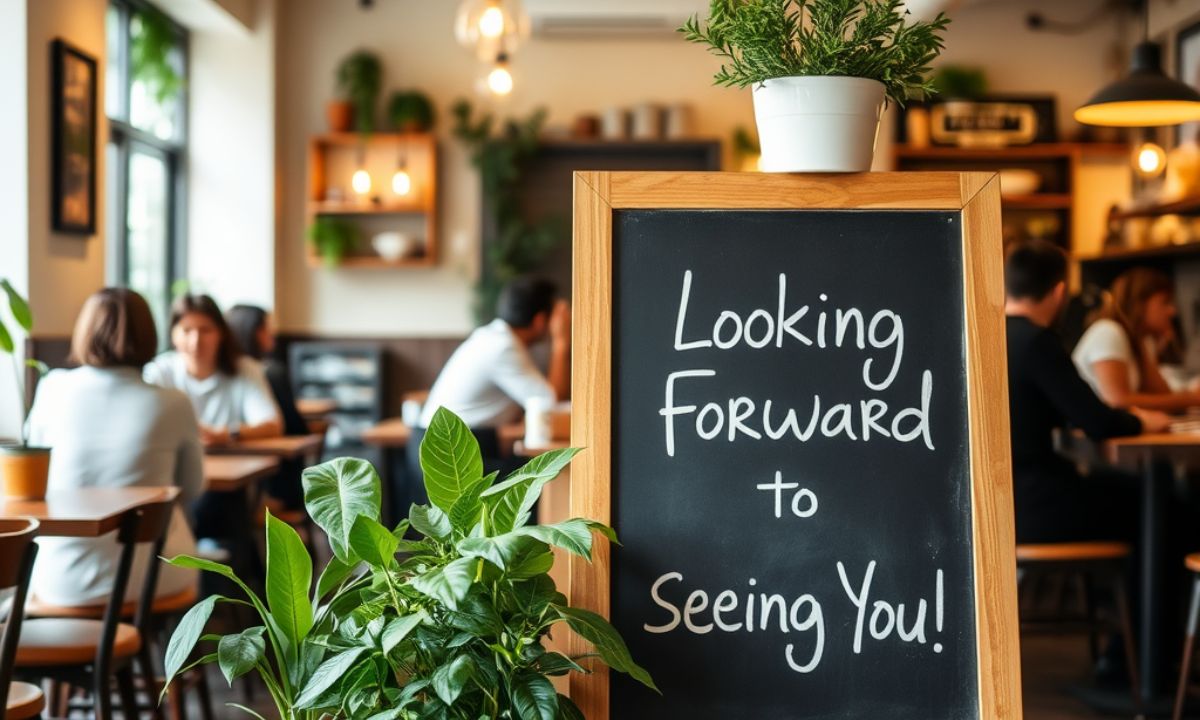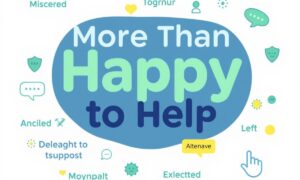Looking forward to seeing you is common but can get repetitive in email and messages.
This guide presents different ways of expressing that basic idea, adding some color and warmth to your writing.
Be it the most formal of business settings or a casual reunion with friends, these phrases will ensure that your anticipation is conveyed in different terms.
Anticipating Our Meeting
“Anticipating Our Meeting” would be the phrase of choice to strike an appropriate balance between warmth and formality when one wants to present an air of professional excitement over a meeting ahead.
This phrase binds together professional readiness with a sincere interest in the interaction itself. This works well in business emails, follow-ups to conferences, and professional networking settings.
This mild expression gives an acknowledgment to the significance of the meeting without bombarding the recipient with too much zeal, thus setting the tone for a pleasant and productive meeting which can be favorable to both parties.
When you tell someone that an upcoming meeting has you anticipating, you are conveying the thought that this meeting has been weighing on your mind, so much so that you are mentally preparing for some constructive engagement.
This expression reinforces your professionalism while keeping it personable long before you meet.
Example: I’m anticipating our meeting on Thursday and have prepared some insights on the quarterly results.
READ MORE: https://travelloverage.com/say-thanks-for-the-heads-up/
Excited About Reuniting
This expression from the heart is perfect for reconnecting with old friends, family, or colleagues after a long time.
Excited about reuniting’ implies friendship and common experience, suggesting a more personal touch directed toward relationships with some history.
The word ‘reuniting’ specifically acknowledges your relationship in the past, and brings in the strong notion of continuity-a shared past, which leads to a present moment of anticipation. This has meanings of pure warmth that far surpass anticipation. Situations like class reunions, family gatherings, or bringing back colleagues will be quite a comfort.
It helps rebuild the ties between you and the person and states that you really appreciate that shared history.
With this phrase, you’re not just recognizing the meeting ahead; you recognize the specialness of reconnecting with someone who once mattered in your life.”
Example: I’m so excited about reuniting with you at the class reunion; it’s been far too long!
Anxiously Awaiting Your Visit
Anyone coming to visit make a house a home-or is it a workplace? Either way, this greeting conveys anticipation and preparation in overdrive.
When you really want someone to feel welcome and respected, this phrase will serve you well. “Anxiously” does not always constitute worry but is wrought with eager-and somewhat impatient-wishful thoughts of the future.
You prepare yourself to welcome them and counting days down till their arrival. This expression would apply to an occasion where you host someone into the In-House living space.
This communicates that you are excited about having them over and that you look forward to their arrival. It mildly suggests that their visit is a privilege with which you are graced-much appreciated by the addressee.
It is especially good for times when you want to convey that someone is coming and that the entire occasion is a focal point in your life.”Anxiously awaiting your visit” is a way of expressing,
“This is a very significant occasion for you, and you are more than welcome in my life.
Example: We are anxiously awaiting your visit and have prepared the guest room with your favorite books.
Enthusiastic for Our Get-Together
The phrase “Enthusiastic for Our Get-Together” sets a conversational, informal, and happy tone at just the right level for a casual social gathering and friendly meeting.
It indicates genuine excitement for getting together without sounding too formal or sentimental.
The word “get-together” adds informality by suggesting a relaxed enjoyment of each other’s company rather than a formal meeting.
Hence, the expression fits well for dinner plans, coffee dates, or any casual social event between friends or acquaintances.
The expression implies fun and enjoyment, thus setting a positive ambience for the expected meeting. It also indicates the expectation of fun while seeing that person and hanging out in a laid-back setting.
When you say it, you are already bringing in a positive casual vibe for your next meeting. It is especially useful for situations where you want to create a sense of comfort and fun.
Example: I’m enthusiastic for our get-together on Friday-I found this new café I think you’ll love!
Looking Forward to Our Encounter
For anticipation stated a bit more formally or differently, “Looking Forward to Our Encounter” is an elegant substitute.
The tone is much more sophisticated and suits well in professional circles or with people with whom you are not so familiar yet.
The term “encounter” denotes something grand and possibly highly significant, thereby making that simple meeting somewhat more noteworthy.
This phrase, in particular, fits a tight context of business communication where you want to stand out slightly from the so-called professional crowd. It expresses respect and consideration but still allows for real anticipation.
The slightly unusual phrasing makes your message memorable without being improper or overly intimate.
First meetings, formal business correspondence, or contexts where you want to show anticipation while keeping up professional boundaries are perfect for this phrase. Interest is implied without definitely overstepping lines or implying overly much familiarity there.
Example: I’m looking forward to our encounter at the conference when we can discuss new developments within the industry.
Thrilled to See You Again
It conveys a sense of excitement from a person’s side time comes to speak about his renewing ties with someone known; “Thrilled to See You Again” in fact expresses an exuberant splendor within itself.
The greatest-cum-output is said phrase when one is to be with someone known, established-cum-positive relationship yet with not encounters recently, at least-not recent yet.
The word “thrilled” has a certain ring traditionally inductive to much excitement rather than anticipation, and just as with ditch for some “again,” it is sufficiently at once understated to be understood-as then-this-is-a-new-moment talk-with-outward expression: Bring this person into your life again.
The point is especially great with personality-type relationships, really because of being in- or having-intrigued expressions of emotion. Less anticipatory, but really single, would be the little inviting phrase to parlay personal states or affairs into things like states of exuberance.
Is sind what one does in bringing the whole point of view back into this one concept: “You are therefore expected to be in Heaven; your happiness is the only source.” For just good usage with friends, family, or most loved-well colleagues parted from for some time reunions.
Example: I’ve so been looking forward to seeing you again after your year overseas; I want all the gossip!
Counting Down to Our Reunion
This particular statement has an extra concrete sense of time and expectation, leading us to believe that you genuinely are counting the days until you meet.
“Counting Down to Our Reunion” is lovely for events that are yet far in the future, and which therefore have the potential of creating building excitement about whatever will take place.
The idea of counting down implies that this meeting is so important that time needs to be marked by it, increasing its standing in your life. The term “reunion” carries connotations of sentiment; strongly suggesting a huge reconnection rather than just a meeting.
This expression is perfect for any event such as those meaningful planned vacations together, visiting after a long separation, or yearly get-togethers with special people in your life. It creates an atmosphere of joint anticipation, whereby both of you are involved in the countdown.
When you say this, you put a shared interest into the air, something that keeps the waiting period alive and strengthens the bond even further.
Example: I’m literally counting down to our reunion next month—just 18 days to go!
Eagerly Anticipating Your Arrival
In a hosting relationship, when someone is coming to you, “Eagerly Anticipating Your Arrival” would actively prepare and truly wait for something exciting to come.
This is an expression with a bit of a formal, gracious quality, making it just the right type of invitation for an important guest or visitor. For example, “eagerly” really connotes enthusiasm while “anticipating” gives a sense of forethought. Both create this…
When arriving at that place specifically symbolizes the moment when one will encounter the person for the first time, the whole moment-at-which the two sets eyes on shaped particularly as one first approaches someone.
Most suited to welcome to your home, office, or an event you are hosting would be such an expression: not that person is just going to be waiting for you but that person is looking forward to-and preparing for-your presence.
Such expression would come across as suggesting that someone’s arrival is a significant occasion for you that you are giving thought and attention to-at the same time making them feel valued or welcomed even before they arrived.
Example: eagerly awaiting for your arrival; we will throw you a have special welcome dinner.
Can’t Wait to Catch Up
“Can’t Wait to Catch Up” sets a note of casual and friendly reconnection to people you know. It emphasizes the sharing of experiences that await these two individuals in a conversation.
The casualness of the phrase “can’t wait” expresses real eagerness in an inviting form. The emphasis of the word “catching up” acknowledges past associations and suggests interest in knowing about the recent present events in their life, which is the promotion of conversation.
This phrase works best for a type of friend or colleagues and acquaintances that you haven’t seen for some time and with whom you already have a working relationship.
It signifies openness toward what they have been through along the way but also manages to set an expectation for mutual conversation.
You will say this not just because you appreciate their presence but because you also want to hear all the stories and happenings. This creates an avenue for meaningful engagement when the two meet.
Example: I can’t wait to catch up over coffee and hear about your new job!
Longing for Our Meet-Up
“Longing for our Meet-Up” has that raw feeling of an anticipatory feeling toward an event. It is a perfect word for intimate friends or family members who are comfortable expressing such strong feelings to one another.
Longing really means much more than just anticipation; it means that someone has missed their absence and now longs to be around them.
The phrase is balanced off by the casual “meet-up,” making the whole thing not too intense and formal. It is ideal for encasing such things as very close friendships, romances, or separation from family.
It states that the time apart was emotionally significant, and joining together again becomes really vital. It is like giving some emotional vulnerability to be shared between two people, which might help most close relationships.
It tells the other person that what they really mean to the speaker is being on some deeper levels, and in this regard, their presence means a lot and is genuinely missed when absent.
Example: I’ve longed for our meet-up since I made those plans-it feels like forever since I’ve connected properly.
Avidly Expecting Our Gathering
The phrase “Avidly Expecting Our Gathering” expresses enthusiasm while also recognizing the collective nature of this social event.
Slightly formal and just right for both formal and informal group situations, the phrase offers some elegance. ‘Avidly’ suggests real enthusiasm and interest, and ‘gathering’ more especially acknowledges the group character of the event.
Thus, it works perfectly in settings like a dinner party, a team event, a family reunion, or just any time a large number of people are coming together.
The phrase conveys a sense of collective anticipation and an affirmation of community long before the event takes place.
One is anticipating not only meeting the individuals but also the common experience that arises from bringing all of them together.
By saying it, one strongly emphasizes cohesion and shared excitement; this is particularly significant, as this will enhance the actual event when that happens.
Example: I’ll be avidly expecting our gathering this weekend; it will be wonderful to have everyone together again.
Anticipatory of Seeing You Soon
More directly anticipating your presence is perhaps what you’d like to convey in some circles; thus, this phrase, “Anticipatory of Seeing You Soon”, is an elegant alternative.
This construction brings a more formal note, thus making it suitable for business communications, while at the same time showing sincere interest.
The slightly unusual phrasing makes it an interesting case to remember without any awkwardness attached.
The focal point being ‘seeing you soon’ provides an immediate sense of interaction, suggesting that the period of being apart is soon to be over. It is perfect in emails to other professionals, for business networking, or formal invitations.
It speaks of professionalism yet protrudes personal interest in the upcoming meeting. You’d set the tone for professional warmth here, which might assist in having positive expectations regarding your interaction.
It would be a wonderful choice when the context is largely professional, yet you’re seeking an edge for attention without stepping beyond the limits.
Example: I’m anticipatory of seeing you soon at the board meeting to discuss our strategic initiatives.”
Yearning for Our Reconnection
“Yearning for Our Reconnection” shows genuine emotional investment for greater emotional excitement with more established relationships.
This phrase is especially appropriate to refer to significant reunions following long periods or relationships formed around strong emotional bonds.
The word “yearning” embraces a deep, heartfelt longing, far beyond mere hopeful expectations; a separation marked by painful and emotional distance.
The term “reconnection” bears meaning as it points to the honor of shared history while looking ahead into the strengthening of ties.
This particular expression is indeed much effective for friends, family members, or very meaningful professional relationships which break over time; it rights that the relationship is a significant emotional investment to you as collateral.
With it, you are conveying emotions that can carry you forward following reconnection, enchanting other significant relationships.
Example: I’ve been yearning for our reconnection since you moved away—letters just aren’t the same as talking face-to-face.
Impatiently Waiting for Your Appearance
The phrase ‘Impatiently Waiting for Your Appearance’ suggests a high degree of gleeful anticipation, with overtones of humor. It’s slightly dramatic and possesses a kind of warmth and character that will work wonders for your communication style.
Impeccably so, the word ‘impatiently’ connotes that the wait could be difficult since one was really looking forward to seeing another person.
The emphasis on this ‘appearance’ elevates it into something like an event or celebration worth commemorating. Such a phrase suits cordial relationships in which emotional expressiveness and mild exaggeration are well accepted: it conveys real exuberance but with a playful flair.
In sending a message like this, you are pouring a bit of personality into your communication while still expressing heartfelt anticipation.
I think this will be an ideal gesture to make someone feel special and appreciated because it communicates that their arrival is worth the wait, no matter how difficult it is.
Example: I am impatiently waiting for your appearance at the party—there is so much more fun when you are around!
Ready and Waiting for You
The term “Ready and Waiting for You” applies where it is already apparent that the people involved have prepared and that they accurately anticipate another person’s arrival.
You can use this phrase either in a business or personal setting if you want to convey empahasis on readiness. Ready refers to the fact that the necessary preparations have been made, while waiting has the anticipatory aspect.
The two together give an impression of being practically and emotionally ready for the meeting ahead. It works well for hosting or customer service occasions or when you just want to focus on being fully ready for someone’s arrival.
It pours a dose of reliability and attentiveness while implying eager anticipation.
Using such words would mean putting the person at ease for now in that all practical bases have been covered, and he or she can look forward to the meeting without worrying about logistics or arrangements.
Example: We’re ready and waiting for you at the office-the conference room has been set up and snacks prepared.
FAQ’s
Which phrase is better suited for formal business settings: “Anticipating Our Meeting” or “Looking Forward to Our Encounter”?
They are both professional with an added touch of genuine interest.
So, what is best for reconnecting with old friends?
“Excited About Reuniting” or “Can’t Wait to Catch Up” spread warmth and honor your common past.
How to express that you were even more excited without losing the professional vibe?
“Eagerly Anticipating Your Arrival” is a perfect balance together with formality.
Which phrase is best suited for a group event?
“Avidly Expecting Our Gathering” call attention to the fact that the event is collective.
What works for a welcoming situation?
“Ready and Waiting for You” or “Anxiously Awaiting Your Visit” point to both preparations and anticipation.
Conclusion
alternatives to ‘looking forward to seeing you’ can lift all your personal and professional exchanges.
Find the one that best relates to your relationship and the context of your meeting such as ‘What a pleasure to meet you!’ or ‘Meeting someone new is always thrilling!’ to add urgency and warmth to your messages.
These expressions create anticipation and build positive expectation even before you’ve met. They’ll transform the meaning for which the right phrase is just information.
You learn to blend your anticipating words with emotion while conveying your personal message as you express it: Meeting someone new is always exciting; rekindling old friendships, networking for business, or planning a family get-together.
Well, however else you might express the anticipation, it will matter. So the broader the vocabulary of anticipation you have, the more likely it is that your connections will be really authentic and your conversations memorable.

I’m Irfan, an experienced SEO content and SEO specialist with 2 years of expertise, currently contributing to Al Jazeera News Website.












